- Asia University
- Study abroad/international exchange
- Voices of students who have studied abroad
- Testimonials/Study Abroad Outcomes (AUEP)
Testimonials/Study Abroad Outcomes (AUEP)
AUEP
Asia University Exchange Program
AUEP
Asia University Exchange Program
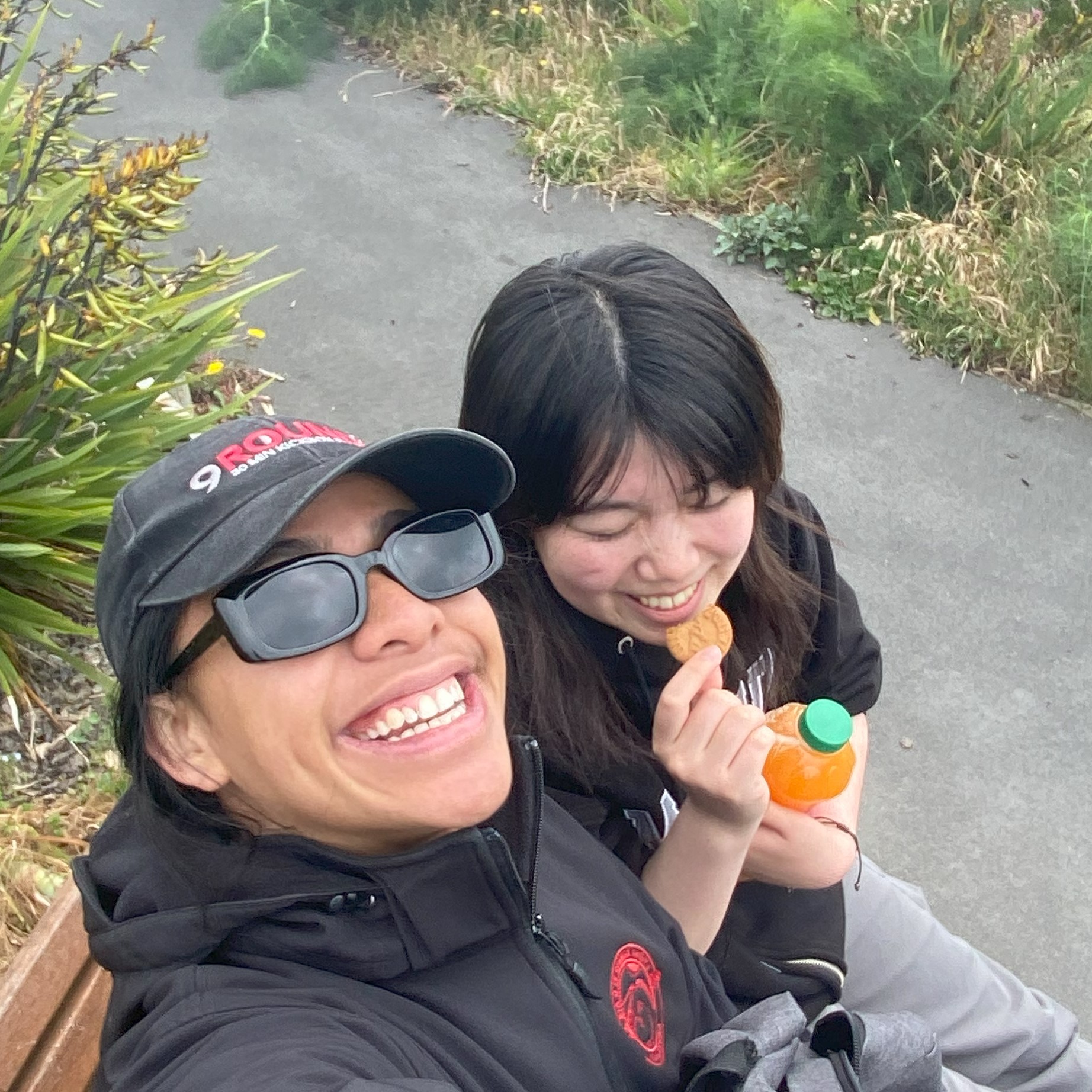
GONDO Yuuna
Destination: New Zealand (Ara Institute of Canterbury)
Reasons for participating in AUEP
My goal in participating in AUEP is to broaden my perspective and understand multiculturalism by experiencing New Zealand culture. Another goal is to deepen my thoughts about people with different languages and cultural backgrounds by improving my imagination and identity.About lessons and life in Japan
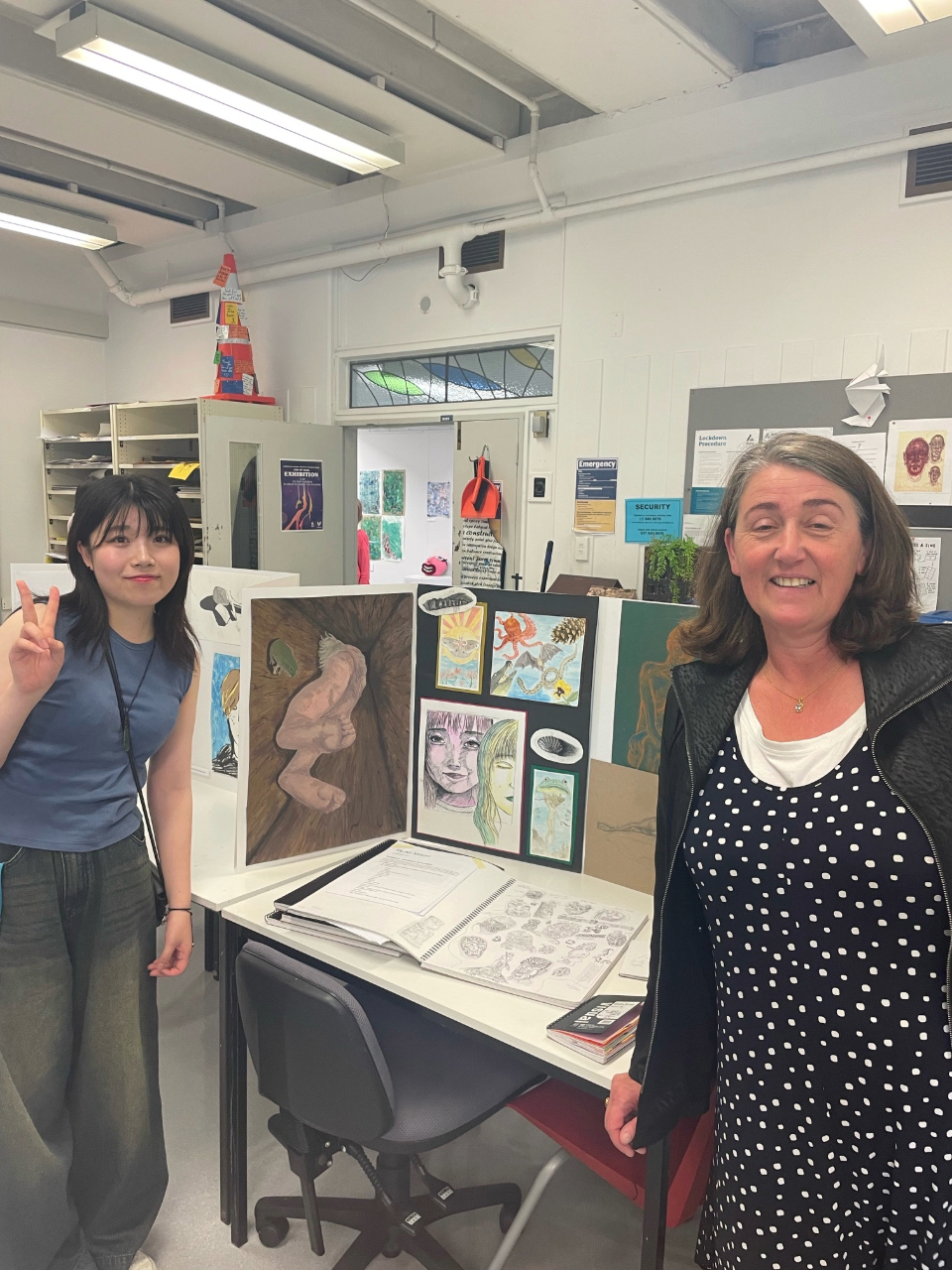
In the first semester, I took a class called "Business in Administration." In this class, we used Microsoft 365 software and learned how to use it, as well as clerical tasks, information management, reception work, and other tasks through practical experience. The main content of the class was to learn how to use accounting software such as MYOB as well as Word and Excel from scratch, and to work on assignments. In the practical aspect, we had conversations at call centers and reception desks, and there were also times when students pointed out each other's shortcomings through feedback. In this class, I was able to learn not only basic business skills, but also practical skills for working abroad. In the second semester, I took a class called "Creativity." This class was an art class. There was a class where we reinterpreted art history by combining it with our own backgrounds and created works, and a class where we created works that expressed our opinions on problems occurring in the world through group work. Through this class, I was able to acquire the ability to have and express my own thoughts about world problems and all kinds of things.
Looking back on International Student
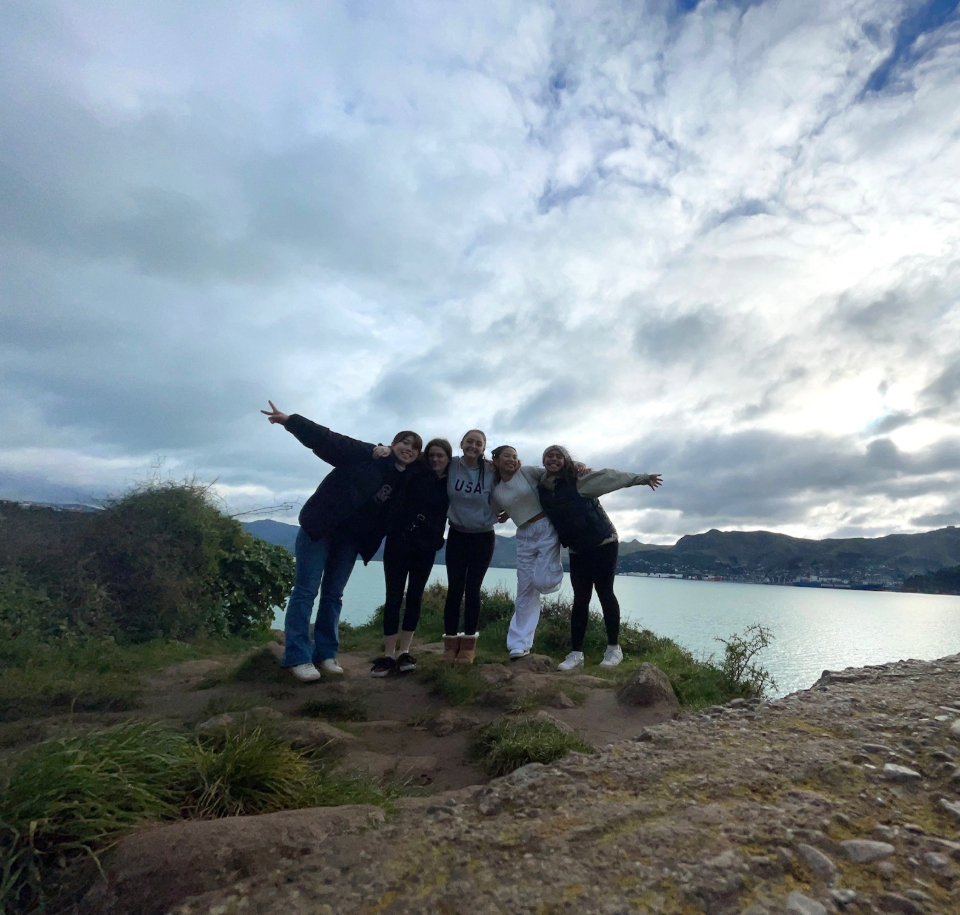
Looking back on my International Student, the most memorable activity was volunteer work. After about half a year of International Student, I was able to participate in an organization called Radio Lollipop. This organization provides a place where sick children in the hospital can have fun playing with us staff members since they cannot go to school. We visit each hospital room, talk to the children, and play games. We also have a radio station, so one of our activities is to play songs requested by the children as a radio DJ. Seeing the children happy, I felt a stronger desire to help children who are suffering from poverty and various other circumstances in the future. At the same time, I realized how little vocabulary I had and that the people around me in class were explaining things to me in an easy-to-understand way. The children would talk to me purely, but there were many times when I was not familiar with the situation and did not know how to talk to them properly, and I could understand in Japanese, but I did not know how to express it in English. Not only through this volunteer work, but also through studying abroad, I have met so many different people and ideas that I feel that I have broadened and deepened my thoughts about how I want to spend my life in the future, and I have come to understand multiculturalism.
Studying abroad
The results and what I learned from this study abroad are of course directly related to the basic skills I need to work overseas in the future, so I would like to make full use of everything I have learned from studying abroad, including the decision-making ability, initiative, and English ability. My English ability has improved significantly over the past year. However, it is still not enough, so I will continue to study. I plan to find a job at a Japanese company that requires English ability, and I would also like to consider working for an overseas company, and would like to make use of the experience I gained from this study abroad. At the same time, because this study abroad experience was a big turning point for me, I would like to share my experience of studying abroad, including how I have grown as a person and the obstacles I have faced.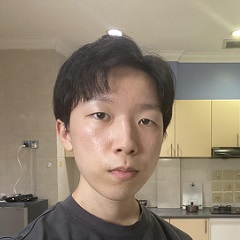
MIMURA Fumiya
Destination: University of Malaya, Malaysia
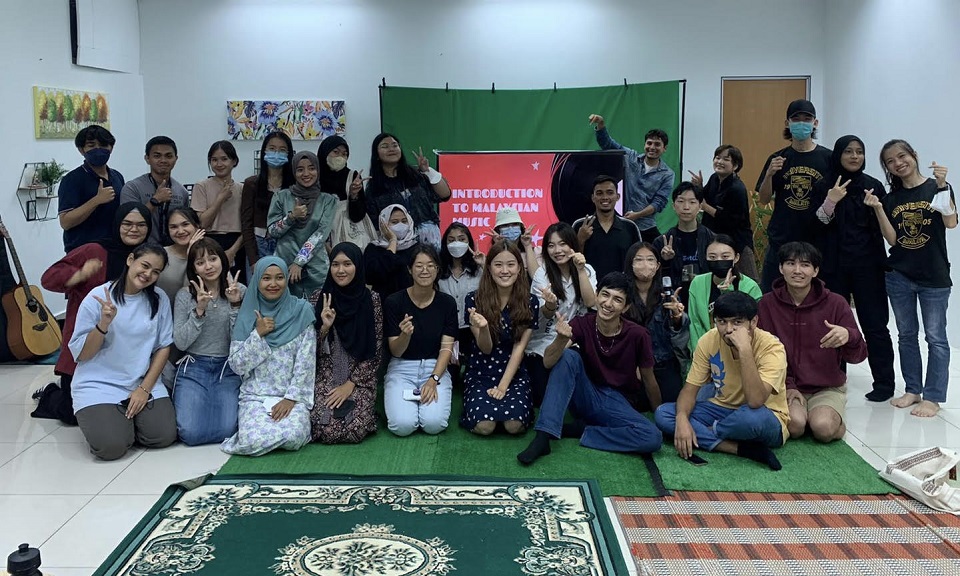
I decided to participate in AUEP because I really wanted to study abroad again after I had to return home midway through AUAP in 2020 due to the effects of COVID-19. I was a little worried about being later in my job search than my classmates when I went abroad in my fourth year, but I also wanted to broaden my horizons by experiencing a different culture while still a student.
At the University of Malaya, where I was dispatched, I took classes in sociology, economics, Malay language, etc. The classes were basically conducted in English, but I had some difficulties understanding the content because the Malay teachers spoke their native language during the classes. In those cases, I spoke to Malay students to supplement the information, but I felt reluctant to try to become friends with them just because they spoke the language. Therefore, I sometimes asked the professors questions directly, but I think it was a good opportunity to converse with Professor in English.
When I woke up in the morning in my dorm and turned on the tap, brown water flowed out, and I realized how grateful I was for the water in Japan. Once, when I accidentally drank tap water in the bathroom of a museum, I thought I was finished, but I didn't get an upset stomach.
One thing that shocked me was the road conditions. In Malaysia, it is common for bus and taxi drivers to honk their horns, and sometimes buses drive with their doors open. They rarely stopped for pedestrians. Incidentally, most of the cars that did stop were luxury cars. However, pedestrians were also very assertive, and I was shocked to see them easily crossing a six-lane road with cars whizzing by.
The biggest change in my way of thinking through this study abroad is that I started to think that English is merely a means of communication. This started when I had an experience where I spoke "correct English" to a non-native speaker and they didn't understand. For example, there was a time when I answered "No, not at all" to "Do you mind...?" and the other person was confused. At first, I thought, "I'm speaking grammatically," but I began to think that it is more important to communicate in a way that avoids misunderstandings. Through studying English for university entrance exams and qualifications, I had become more and more aware of the importance of English being grammatical and having a native feel, so this was a big change in my values. If I had studied abroad in a native English-speaking country, this change in thinking might not have happened. I also think that it was beneficial to practice understanding accented English. There are many non-native speakers in the world, so I think this was an important skill to acquire.
After graduating from university, I began working at a certain country's embassy as a diplomatic mission officer.
I would like to utilize the adaptability and English skills I have acquired through studying abroad to do my best to contribute to diplomacy in some small way, as a behind-the-scenes supporter.
At the University of Malaya, where I was dispatched, I took classes in sociology, economics, Malay language, etc. The classes were basically conducted in English, but I had some difficulties understanding the content because the Malay teachers spoke their native language during the classes. In those cases, I spoke to Malay students to supplement the information, but I felt reluctant to try to become friends with them just because they spoke the language. Therefore, I sometimes asked the professors questions directly, but I think it was a good opportunity to converse with Professor in English.
When I woke up in the morning in my dorm and turned on the tap, brown water flowed out, and I realized how grateful I was for the water in Japan. Once, when I accidentally drank tap water in the bathroom of a museum, I thought I was finished, but I didn't get an upset stomach.
One thing that shocked me was the road conditions. In Malaysia, it is common for bus and taxi drivers to honk their horns, and sometimes buses drive with their doors open. They rarely stopped for pedestrians. Incidentally, most of the cars that did stop were luxury cars. However, pedestrians were also very assertive, and I was shocked to see them easily crossing a six-lane road with cars whizzing by.
The biggest change in my way of thinking through this study abroad is that I started to think that English is merely a means of communication. This started when I had an experience where I spoke "correct English" to a non-native speaker and they didn't understand. For example, there was a time when I answered "No, not at all" to "Do you mind...?" and the other person was confused. At first, I thought, "I'm speaking grammatically," but I began to think that it is more important to communicate in a way that avoids misunderstandings. Through studying English for university entrance exams and qualifications, I had become more and more aware of the importance of English being grammatical and having a native feel, so this was a big change in my values. If I had studied abroad in a native English-speaking country, this change in thinking might not have happened. I also think that it was beneficial to practice understanding accented English. There are many non-native speakers in the world, so I think this was an important skill to acquire.
After graduating from university, I began working at a certain country's embassy as a diplomatic mission officer.
I would like to utilize the adaptability and English skills I have acquired through studying abroad to do my best to contribute to diplomacy in some small way, as a behind-the-scenes supporter.
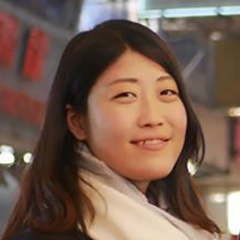
Kiyohara Moka
Destination: China (Hong Kong), Xinya College, The Chinese University of Hong Kong
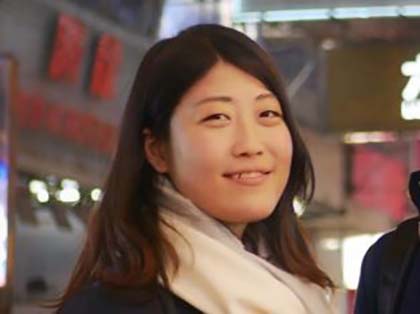
Kiyohara Moka
Faculty of Law Department of Law
Faculty of Law Department of Law
- Participated in AUAP in 2015 Study abroad at Western Washington University in the United States for 5 months
- Participated in AUEP in 2017 Studied abroad for about a year in China (Hong Kong), Chinese University of Hong Kong Xinya Academy (Active as the first International Student member in the chorus of the study abroad destination)
What are your goals at AUEP?
The learning goals are to gain a deep understanding of local communities and Asian cultures, as well as the legal customs of China and Hong Kong, which differ from those of Japan, to acquire practical knowledge of international business. With this in mind, I embarked on International Student.What kind of classes did you take there?
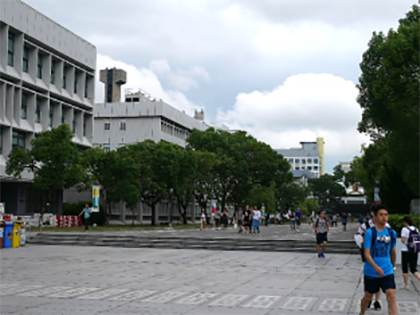
In the first semester, I took ``Chinese Languages, Culture and Language Learning,'' ``Japan in East Asia Politics,'' and ``Introductory Financial Accounting.''
In Chinese Languages, Culture and Language Learning, we learned about the local cultures of China and Hong Kong from the perspective of linguistics, and through discussions with international International Student from each country, we shared the differences in language and culture of each country.
In the Japan in East Asia Politics class, under the guidance of Professor who has served as an ambassador and representative of Japan to the United Nations, students discuss the role of Japan in the political situation of the East Asian region with local students and International Student from other countries and regions. I did. Since I was the only Japanese student in the class, I was always asked for my opinions and ideas as a Japanese person. rice field. In the final presentation, I proposed the Japanese government's approach to China's One Belt, One Road policy.
In Introductory Financial Accounting, I was able to master the basics of financial accounting that I should understand as a business person.
In the second semester, I took Chinese (Mandarin), ”Introduction of International Business,” and ”Globalization, Cultures and Societies,” which I could not take in the first semester. By taking Putonghua Application of Vocabulary and Grammar I and Putonghua Oral Skills Practice I, I was able to master the basics of Mandarin Chinese. After returning to Japan and finding a job, I took on the challenge of acquiring a Chinese qualification.
In Introduction of International Business, I acquired basic knowledge of strategies and frameworks for international business development, and learned more practically through group projects and presentations. Through a project in a group rich in ethnic diversity, I was able to learn firsthand how difficult it is to carry out work due to differences in awareness and ideas, and how to harmonize opinions in such a situation.
In Globalization, Cultures and Societies, we systematically studied the differences in stages and processes of globalization from the perspective of each culture and society. In the class presentation, we took up "sushi" and analyzed the reception of different food cultures based on theory.
In Chinese Languages, Culture and Language Learning, we learned about the local cultures of China and Hong Kong from the perspective of linguistics, and through discussions with international International Student from each country, we shared the differences in language and culture of each country.
In the Japan in East Asia Politics class, under the guidance of Professor who has served as an ambassador and representative of Japan to the United Nations, students discuss the role of Japan in the political situation of the East Asian region with local students and International Student from other countries and regions. I did. Since I was the only Japanese student in the class, I was always asked for my opinions and ideas as a Japanese person. rice field. In the final presentation, I proposed the Japanese government's approach to China's One Belt, One Road policy.
In Introductory Financial Accounting, I was able to master the basics of financial accounting that I should understand as a business person.
In the second semester, I took Chinese (Mandarin), ”Introduction of International Business,” and ”Globalization, Cultures and Societies,” which I could not take in the first semester. By taking Putonghua Application of Vocabulary and Grammar I and Putonghua Oral Skills Practice I, I was able to master the basics of Mandarin Chinese. After returning to Japan and finding a job, I took on the challenge of acquiring a Chinese qualification.
In Introduction of International Business, I acquired basic knowledge of strategies and frameworks for international business development, and learned more practically through group projects and presentations. Through a project in a group rich in ethnic diversity, I was able to learn firsthand how difficult it is to carry out work due to differences in awareness and ideas, and how to harmonize opinions in such a situation.
In Globalization, Cultures and Societies, we systematically studied the differences in stages and processes of globalization from the perspective of each culture and society. In the class presentation, we took up "sushi" and analyzed the reception of different food cultures based on theory.
What have you worked on outside of class?
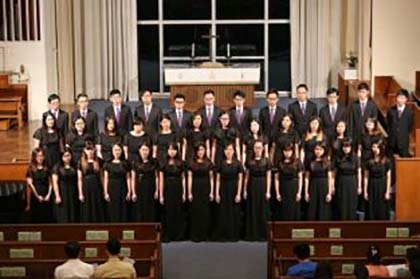
Mainly extracurricular activities include joining a university choir, volunteering at schools in Hong Kong and mainland China, research activities as a student team at the Japanese Chamber of Commerce in Hong Kong, and overseas corporate business for a company that has been connected with the Chamber of Commerce. I worked on one of the help.
As the first international International Student member of the university choir, he practiced Cantonese and English with the help of his friends, and completed two concerts, a Christmas performance at a hotel, and a concert tour in Taiwan. By jumping into the local community with my favorite chorus, not only was I able to learn more about local life and society, but I was also able to interact with a Taiwanese choir. Taking advantage of this experience, I am currently planning exchange concerts with Hong Kong and Taiwan with a Japanese choir. The knowledge of the values and culture of the local people I gained through this activity was very useful for market research in class, and I once again felt the importance of understanding the local society in overseas business.
As a school volunteer, I visited junior high schools and high schools in Hong Kong and Guangzhou respectively, and through guest talks and English classes at school-wide assemblies, I hope to convey and share the appeal of Japanese culture, which is not limited to pop culture, and is now widely accepted around the world. I was able to do it.
The student team of the Society of Commerce and Industry was assigned to the "Research Project for Entry of Japanese Companies into Hong Kong", where they explored the policies of the Hong Kong government and examined fields in which Japanese companies could participate. As a result of research, we focused on the silver industry based on the declining birthrate and aging population in Hong Kong. We reported to the team, life communication subcommittee Executive chair, Board of Directors, and vice Executive chair, Board of Directors. Through this project, I was able to not only deepen my knowledge of social issues in Hong Kong and Japanese industries, but also seniors who are active in companies that lead Japan, and students from other universities who are also studying in Hong Kong. I was able to build a relationship with
Finally, in helping with overseas corporate business, under the company representative, I was involved in drafting tie-up plans with various companies and local governments in inbound-related and export expansion projects for Japanese food products. Through repeated discussions with the representative, I was able to understand the needs of the local market and the needs of each company, and I was able to learn more practical business thinking by proposing a number of projects that make use of our assets. Also, by actually being involved in a project to disseminate Japanese culture, the vision of what I want to achieve in the future, which I had envisioned before entering university, became clearer.
As the first international International Student member of the university choir, he practiced Cantonese and English with the help of his friends, and completed two concerts, a Christmas performance at a hotel, and a concert tour in Taiwan. By jumping into the local community with my favorite chorus, not only was I able to learn more about local life and society, but I was also able to interact with a Taiwanese choir. Taking advantage of this experience, I am currently planning exchange concerts with Hong Kong and Taiwan with a Japanese choir. The knowledge of the values and culture of the local people I gained through this activity was very useful for market research in class, and I once again felt the importance of understanding the local society in overseas business.
As a school volunteer, I visited junior high schools and high schools in Hong Kong and Guangzhou respectively, and through guest talks and English classes at school-wide assemblies, I hope to convey and share the appeal of Japanese culture, which is not limited to pop culture, and is now widely accepted around the world. I was able to do it.
The student team of the Society of Commerce and Industry was assigned to the "Research Project for Entry of Japanese Companies into Hong Kong", where they explored the policies of the Hong Kong government and examined fields in which Japanese companies could participate. As a result of research, we focused on the silver industry based on the declining birthrate and aging population in Hong Kong. We reported to the team, life communication subcommittee Executive chair, Board of Directors, and vice Executive chair, Board of Directors. Through this project, I was able to not only deepen my knowledge of social issues in Hong Kong and Japanese industries, but also seniors who are active in companies that lead Japan, and students from other universities who are also studying in Hong Kong. I was able to build a relationship with
Finally, in helping with overseas corporate business, under the company representative, I was involved in drafting tie-up plans with various companies and local governments in inbound-related and export expansion projects for Japanese food products. Through repeated discussions with the representative, I was able to understand the needs of the local market and the needs of each company, and I was able to learn more practical business thinking by proposing a number of projects that make use of our assets. Also, by actually being involved in a project to disseminate Japanese culture, the vision of what I want to achieve in the future, which I had envisioned before entering university, became clearer.
How would you sum up your study abroad experience at AUEP?
Looking back on my one-year International Student, what I enjoyed most was the encounters and conversations with many people. There is an irreplaceable pleasure in meeting people with a wide variety of ideas that I would not have been able to meet in Japan, and unraveling their values and cultural views one by one through dialogue. bottom. On the other hand, what I struggled with was learning new fields in English, self-improvement to work on an equal footing with excellent students from all over the world, and managing daily tasks. Until now, I had mainly studied law, so I had to learn basic knowledge on my own in areas such Lecture business. In addition to the university classes, I also participated in extracurricular activities, so it was very difficult to manage everything in a limited amount of time. Not only that, I was able to spend a very fulfilling 8 months International Student.Summarizing the results based on the above activities during my study abroad, after returning to Japan, I scored a TOEIC score that exceeded the target, further improved my English, helped with the activities of the Chamber of Commerce and Industry and overseas business, volunteered locally, and performed in the university chorus. Through joining the group, achieve the learning goals of gaining a deep understanding of the local society and Asian culture, forming international connections, and acquiring practical knowledge in international business, and the life goal of transmitting and sharing Japanese culture. I think I was able to do it.
Utilizing the experience and knowledge I gained from studying abroad this time, I completed my graduation research on the theme of contract disputes in international business. We would like to contribute to society.
Achievements after Studying Abroad ~My Before After~
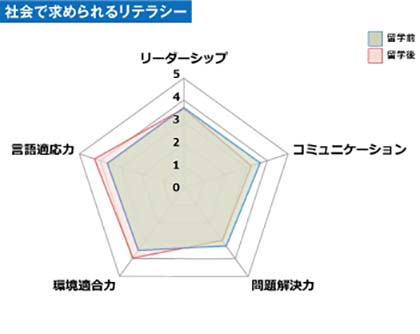
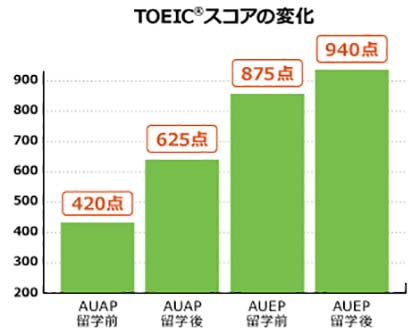
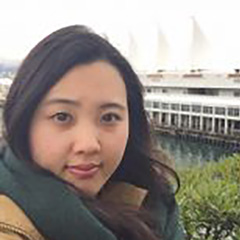
KONO Risa
Destination: Western Washington University, USA
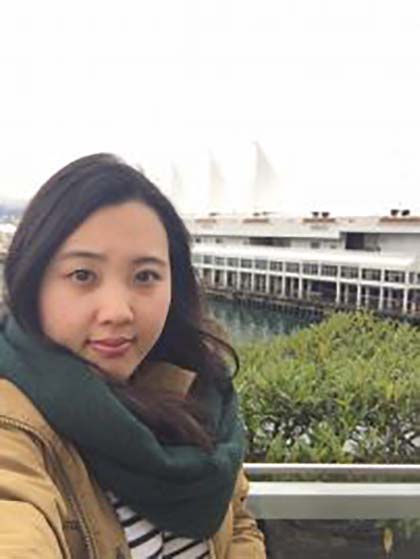
KONO Risa
Faculty of International Relations Department of Multicultural Communication
Faculty of International Relations Department of Multicultural Communication
- Participated in AUAP in 2015 Study abroad at Western Washington University in the United States for about 5 months
- Participated in AUEP in 2016 Study abroad at Western Washington University in the United States for about a year
What are your goals at AUEP?
I set four goals and left for America.The first is to improve your English skills, the second is to acquire the ability to overcome difficulties, the third is to create irreplaceable memories with your friends, and the fourth is to acquire a positive attitude.
What kind of classes did you take?
Western Washington University operates on a three-semester system. In the first semester, I took classes in cultural anthropology, environmental studies, and Spanish.I remember being very surprised by the difference in atmosphere, because all the classes except Spanish were held in large classrooms with over 100 students. Even in large classes, students did not hesitate to raise their hands, and laughter was everywhere, which I felt was very different from classes in Japan.
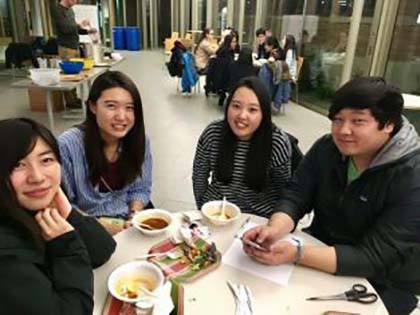
Before I left, I thought that this study abroad period would be long, but when I returned to Japan, I felt that it was short because it was fulfilling. In the first semester, it took me a long time to translate what I wanted to say into English in my head, and I sometimes gave up trying to convey everything. However, I was glad that I gradually got used to English and my Japanese became rather stuttering. In addition, friends and acquaintances around me told me that my English had improved since I arrived in the United States, which encouraged me and motivated me to work even harder.
It was difficult to get used to classes in America, but I was able to take classes that I would not have experienced in Japan. There were some hardships, but it was a long-term study abroad that I decided to go on myself.
Looking back on the four goals I set before my departure, I am satisfied that I have achieved them all. Speaking, which was particularly difficult before departure, I feel that I have improved dramatically by speaking English every day, which is difficult in Japan. I was a little disappointed that I was just one step away from reaching 900 on TOEIC® before I left Japan, but after returning to Japan, I was able to see the results of my study abroad in a visible way by surpassing 900 on TOEIC®. rice field. In the future, I would like to think about how I can maintain my English skills even if I have fewer opportunities to use English.
In the process of aiming for AUEP, there were times when I thought about giving up because it was difficult, but because I didn't give up, I was able to experience a lot and improve myself. Also, when I was studying abroad, I was in a situation where nothing would start unless I acted proactively. Until now, I was able to change my personality, which tended to act while looking at what the people around me were doing. I would like to keep in mind every day to be honest with myself about what I want to do once, and to do it positively without fear of the result. Although we live in different places, I would like to continue to receive inspiration from my friends. I want to make the most of what I have learned during International Student, continue to study hard, and after graduating from university, I want to get a job that I really want to do, with the same feeling I had when I decided to participate in AUEP.
It was difficult to get used to classes in America, but I was able to take classes that I would not have experienced in Japan. There were some hardships, but it was a long-term study abroad that I decided to go on myself.
Looking back on the four goals I set before my departure, I am satisfied that I have achieved them all. Speaking, which was particularly difficult before departure, I feel that I have improved dramatically by speaking English every day, which is difficult in Japan. I was a little disappointed that I was just one step away from reaching 900 on TOEIC® before I left Japan, but after returning to Japan, I was able to see the results of my study abroad in a visible way by surpassing 900 on TOEIC®. rice field. In the future, I would like to think about how I can maintain my English skills even if I have fewer opportunities to use English.
In the process of aiming for AUEP, there were times when I thought about giving up because it was difficult, but because I didn't give up, I was able to experience a lot and improve myself. Also, when I was studying abroad, I was in a situation where nothing would start unless I acted proactively. Until now, I was able to change my personality, which tended to act while looking at what the people around me were doing. I would like to keep in mind every day to be honest with myself about what I want to do once, and to do it positively without fear of the result. Although we live in different places, I would like to continue to receive inspiration from my friends. I want to make the most of what I have learned during International Student, continue to study hard, and after graduating from university, I want to get a job that I really want to do, with the same feeling I had when I decided to participate in AUEP.
In the second semester, I took cultural anthropology, environmental ethics, and Spanish. At Asia University, I also took cultural anthropology as a required course in Department of Multicultural Communication, but learning about different cultures, which mainly focus on American ways of thinking, was very different from learning about different cultures, which mainly focus on Japanese ways of thinking. In class, we were given an assignment to read a book about illegal immigration from Mexico and write a report. At the time, the US was holding a presidential election, and the issue of illegal immigration in Mexico was attracting a lot of attention. I was originally interested in Mexico, and had studied it in Japan, so this was an impressive assignment, and at the same time, it stimulated my desire to learn more.
I decided to take Environmental Ethics because I had taken Environmental Studies in the first semester and had become interested in the environment. I learned about ethical thinking on global warming and animal Laboratory Work. There is no single answer to ethics, and opinions vary greatly from person to person, so writing the essay was very difficult. Even if you decide on your own opinion, there will always be opposing opinions, and I learned the difficulty and importance of sticking to your opinion to the end.
In the third semester, I took linguistics, religious ethics, and Spanish. In linguistics, I learned about the history and pronunciation of English, second language acquisition, bilingualism, and so on. As a culmination of the class, I wrote a report on second language acquisition, which I completed from the perspective of a foreigner learning English, and Professor evaluated it. Learning English from a linguistic perspective made me more interested in English than ever before, which led to an increase in my motivation to learn. In ethics, instead of learning about a specific religion, it was a class where we thought about the fundamental significance of religion, such as whether God exists or not.
In the Spanish class I took throughout the three semesters, I was able to improve my overall Spanish language skills through essays and presentations in Spanish, which I had never experienced in Japan. Some of my classmates were the same throughout the three semesters, and I was able to build friendships with them.
Looking back on your life there, how was it?
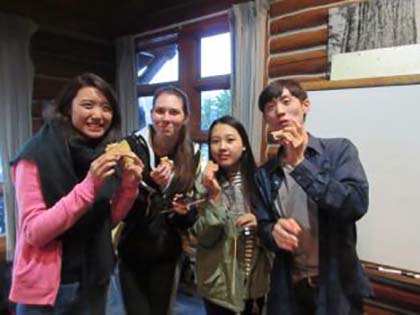
One thing that left an impression on me in my daily life was interacting with international International Student from various countries and local students.
Many International Student come to Western Washington University from all over the world, and there were many events where International Student and local students interacted. The most memorable experience was the BBQ held by the lake. Also, I was surprised that other International Student were interested in Japan, but at the same time, I was very happy and proud to explain Japanese culture. This event was held right after the first semester started, so it was a good opportunity for International Student who were nervous and anxious to meet a lot of people. I had the valuable experience of eating out with my American and Taiwanese friends after school and on weekends, and of staying at an American friend's house.
In Japan, I live with my family, so there are many things I don't have to do by myself, but in America, I had to live in a dormitory and do everything myself, including shopping, laundry, cleaning, and cooking. There were times when it was difficult to find time because I was so busy with classes and other activities, but this experience made me realize once again the importance of being independent and the gratitude I have for my family. There were a lot of International Student around me who lived like this, and it was a good memory to have several dinners where we cooked and brought together dishes from each country.
Many International Student come to Western Washington University from all over the world, and there were many events where International Student and local students interacted. The most memorable experience was the BBQ held by the lake. Also, I was surprised that other International Student were interested in Japan, but at the same time, I was very happy and proud to explain Japanese culture. This event was held right after the first semester started, so it was a good opportunity for International Student who were nervous and anxious to meet a lot of people. I had the valuable experience of eating out with my American and Taiwanese friends after school and on weekends, and of staying at an American friend's house.
In Japan, I live with my family, so there are many things I don't have to do by myself, but in America, I had to live in a dormitory and do everything myself, including shopping, laundry, cleaning, and cooking. There were times when it was difficult to find time because I was so busy with classes and other activities, but this experience made me realize once again the importance of being independent and the gratitude I have for my family. There were a lot of International Student around me who lived like this, and it was a good memory to have several dinners where we cooked and brought together dishes from each country.
How would you sum up your study abroad experience at AUEP?

Before I left, I thought that this study abroad period would be long, but when I returned to Japan, I felt that it was short because it was fulfilling. In the first semester, it took me a long time to translate what I wanted to say into English in my head, and I sometimes gave up trying to convey everything. However, I was glad that I gradually got used to English and my Japanese became rather stuttering. In addition, friends and acquaintances around me told me that my English had improved since I arrived in the United States, which encouraged me and motivated me to work even harder.
It was difficult to get used to classes in America, but I was able to take classes that I would not have experienced in Japan. There were some hardships, but it was a long-term study abroad that I decided to go on myself.
Looking back on the four goals I set before my departure, I am satisfied that I have achieved them all. Speaking, which was particularly difficult before departure, I feel that I have improved dramatically by speaking English every day, which is difficult in Japan. I was a little disappointed that I was just one step away from reaching 900 on TOEIC® before I left Japan, but after returning to Japan, I was able to see the results of my study abroad in a visible way by surpassing 900 on TOEIC®. rice field. In the future, I would like to think about how I can maintain my English skills even if I have fewer opportunities to use English.
In the process of aiming for AUEP, there were times when I thought about giving up because it was difficult, but because I didn't give up, I was able to experience a lot and improve myself. Also, when I was studying abroad, I was in a situation where nothing would start unless I acted proactively. Until now, I was able to change my personality, which tended to act while looking at what the people around me were doing. I would like to keep in mind every day to be honest with myself about what I want to do once, and to do it positively without fear of the result. Although we live in different places, I would like to continue to receive inspiration from my friends. I want to make the most of what I have learned during International Student, continue to study hard, and after graduating from university, I want to get a job that I really want to do, with the same feeling I had when I decided to participate in AUEP.
It was difficult to get used to classes in America, but I was able to take classes that I would not have experienced in Japan. There were some hardships, but it was a long-term study abroad that I decided to go on myself.
Looking back on the four goals I set before my departure, I am satisfied that I have achieved them all. Speaking, which was particularly difficult before departure, I feel that I have improved dramatically by speaking English every day, which is difficult in Japan. I was a little disappointed that I was just one step away from reaching 900 on TOEIC® before I left Japan, but after returning to Japan, I was able to see the results of my study abroad in a visible way by surpassing 900 on TOEIC®. rice field. In the future, I would like to think about how I can maintain my English skills even if I have fewer opportunities to use English.
In the process of aiming for AUEP, there were times when I thought about giving up because it was difficult, but because I didn't give up, I was able to experience a lot and improve myself. Also, when I was studying abroad, I was in a situation where nothing would start unless I acted proactively. Until now, I was able to change my personality, which tended to act while looking at what the people around me were doing. I would like to keep in mind every day to be honest with myself about what I want to do once, and to do it positively without fear of the result. Although we live in different places, I would like to continue to receive inspiration from my friends. I want to make the most of what I have learned during International Student, continue to study hard, and after graduating from university, I want to get a job that I really want to do, with the same feeling I had when I decided to participate in AUEP.
Achievements after Studying Abroad ~My Before After~
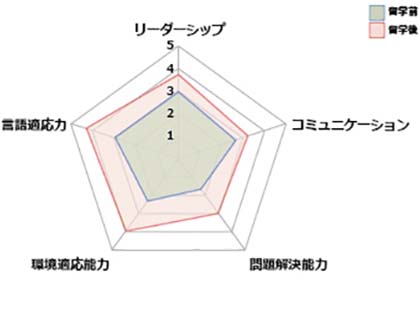
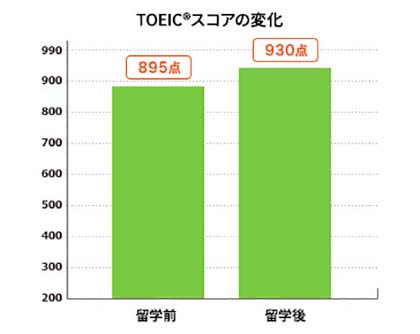
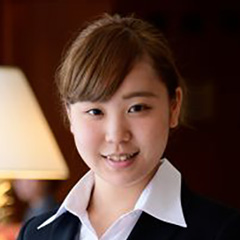
Erika Tada
Destination: East China Normal University, China
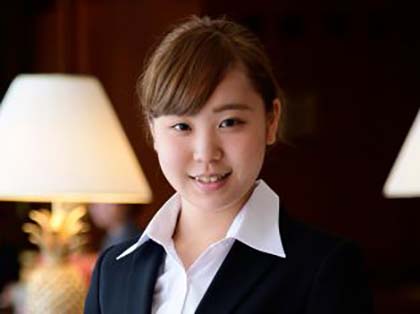
Erika TADA
Faculty of Economics Department of Economics
Faculty of Economics Department of Economics
- Participated in 2015 AUCP Study abroad at Dalian University of Foreign Studies in China for about 5 months (experienced an internship at a Japanese hotel in Dalian)
- Participated in AUEP in 2016 Study abroad at East China Normal University in China for about a year
What are your goals at AUEP?
After studying in China at “ASIA YUME COLLEGE” and my internship experience during that period, I felt that there were many things I was lacking in, and that I wanted to study more and experience more things.・I decided to challenge International Student exchange program (AUEP).In the first semester of study abroad, students will improve their Chinese level at East China Normal University, where they will be studying abroad, and at the same time, understand the actual situation of Japanese language education, such as the Japanese language department and off-campus Japanese language classes. In the second semester, based on the internship, enter the undergraduate course and learn about international business in Chinese with regular students. I came to study abroad with that goal in mind.
What kind of classes did you take there?
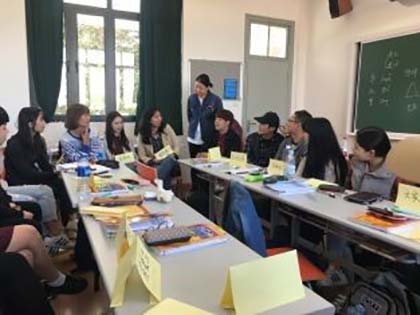
In the first semester, I entered a course to learn Chinese with International Student and focused on studying Chinese. After I arrived, I was assigned to a class through a placement test, so I think the content of the class suited me. Many of my classmates had been studying Chinese for more than five years, and the teachers were only able to guess people who could speak the language. For that reason, at first, when I had an assignment, I had to do it myself and then ask a Chinese person to correct it.
However, I worked hard and got used to it, and after the midterm exam, I spent every day with my classmates, and the more I went on trips, the more I became able to blend in with the class, and my teacher became the number one person in the class. I still vividly remember how happy I was when my classmate said to me, "Recently, I've been getting a lot of attention from Erica." In this first semester class, I learned the importance of having confidence in speaking Chinese.
In the second semester, I entered Faculty of Economics and studied international business negotiations and international marketing. Since the content of the class was in a field I had never studied in Japan, I used YouTube and the Internet to review what I didn't understand in Chinese, and I was able to keep up with the class somehow. Also, unlike Japanese university classes, it was impressive that there was a lot of group work and presentations.
Furthermore, since I am an international International Student myself, I had many opportunities to give presentations about Japan. I spoke in Chinese alone for 20 minutes in front of nearly 100 Chinese students. At first, I think it was unbearable to listen to, but I gradually got used to it by experiencing presentations many times. I think this experience gave me a good chance to build my confidence.
However, I worked hard and got used to it, and after the midterm exam, I spent every day with my classmates, and the more I went on trips, the more I became able to blend in with the class, and my teacher became the number one person in the class. I still vividly remember how happy I was when my classmate said to me, "Recently, I've been getting a lot of attention from Erica." In this first semester class, I learned the importance of having confidence in speaking Chinese.
In the second semester, I entered Faculty of Economics and studied international business negotiations and international marketing. Since the content of the class was in a field I had never studied in Japan, I used YouTube and the Internet to review what I didn't understand in Chinese, and I was able to keep up with the class somehow. Also, unlike Japanese university classes, it was impressive that there was a lot of group work and presentations.
Furthermore, since I am an international International Student myself, I had many opportunities to give presentations about Japan. I spoke in Chinese alone for 20 minutes in front of nearly 100 Chinese students. At first, I think it was unbearable to listen to, but I gradually got used to it by experiencing presentations many times. I think this experience gave me a good chance to build my confidence.
What have you worked on outside of class?
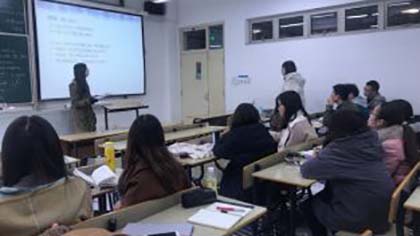
Volunteer for internship and Japanese language education. During the Lunar New Year holiday in China, I did an internship at Hotel Nikko Shanghai for a month. In addition to the internship at the Nikko Hotel Shanghai, during the month, I had the opportunity to talk many times with people working at the Okura Garden Hotel Shanghai, and the opportunity to tour the Nikko Hotels in Wuxi and Suzhou. And so on, I experienced a lot of things that I can't usually experience.
In addition, during the first and second semesters and outside of class, I participated in classes at the Japanese Department of Shanghai University and learned how foreigners learn Japanese from the standpoint of a student. In the second semester, I actually had students at an external Japanese language class and had the experience of teaching Japanese. Even though I felt frustrated that I couldn't explain the Japanese that I take for granted, I did my best to help the students who listened intently to my explanations. A student who started reading and writing "aiueo" together eventually became able to read and write all hiragana and katakana, and was able to have simple conversations. I myself was encouraged by the growth, and it was also an opportunity to work hard in class.
In addition, during the first and second semesters and outside of class, I participated in classes at the Japanese Department of Shanghai University and learned how foreigners learn Japanese from the standpoint of a student. In the second semester, I actually had students at an external Japanese language class and had the experience of teaching Japanese. Even though I felt frustrated that I couldn't explain the Japanese that I take for granted, I did my best to help the students who listened intently to my explanations. A student who started reading and writing "aiueo" together eventually became able to read and write all hiragana and katakana, and was able to have simple conversations. I myself was encouraged by the growth, and it was also an opportunity to work hard in class.
How would you sum up your study abroad experience at AUEP?
Looking back on it now, I think it was a year in which I was able to do what I wanted to do before studying abroad and what I wanted to do locally. I was able to do my best in a wide range of ways, such as "enjoy when I have fun" with foreign friends, "do my best when I try" when studying Chinese and the Faculty of Faculty of Economics as a student, and overcome difficulties positively during internships and classes. .In the future, in order to connect "Japanese language education," which I became interested in after studying abroad, and "Japanese companies," I will work on the theme of "supporting employment in Japan for highly-skilled foreign talent." I am planning to go. As one of these activities, I will use a program called "NIHONGO Partners" implemented by the Japan Foundation, and will be working in the field of Japanese language education in Indonesia for eight months. I strongly hope that I can become a person who can contribute to society in return for the growth I have received from Asia University and people around the world.
Achievements after Studying Abroad ~My Before After~
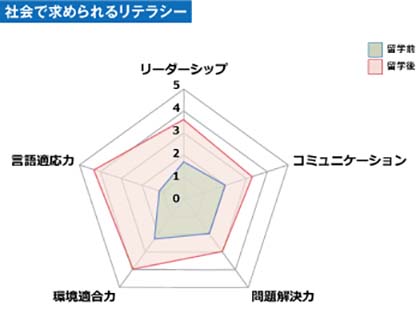
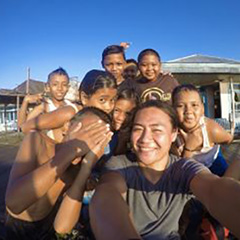
OGURA Fuya
Destination: University of Indonesia, Indonesia
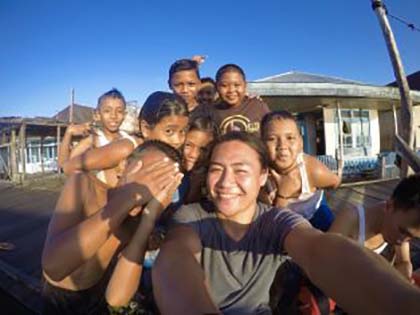
OGURA Fuya
Faculty of International Relations Department of Multicultural Communication
Faculty of International Relations Department of Multicultural Communication
- Participated in 2014 AUAP Study abroad at San Diego State University, USA for about 5 months
- Participated in AUEP in 2016 Study abroad at the University of Indonesia, Indonesia for about a year
What are your goals at AUEP?
My goals for studying abroad in Indonesia were broadly divided into two. The first was to improve my Indonesian language skills, and the second was to learn from Indonesia the ideas, customs, and values that Japan needs from the perspective of a multicultural society. By actually living there for a long period of time, I was able to learn about the local community and the relationships between people there. Also, by becoming a member of the community, I was able to learn about the values of the local residents, and I thought that I could contribute to the development of the relationship between Japan and Indonesia in the future.What kind of classes did you take?
The Indonesian language course I attended was for foreigners only, so all the students were foreigners. There are three levels: Beginner, Intermediate, and Advanced. In the beginner's class, speaking is the main class, so there were a lot of opportunities to make groups and talk in front of the class. Therefore, even students who have never studied Indonesian before will be able to speak Indonesian with local residents by the time they graduate from this class. By the way, by the time I finished the beginner's class, I had to negotiate prices at the market, and in my private life, the inconvenience caused by the language had almost disappeared.Intermediate classes are mainly grammar and vocabulary classes. Formal expressions and various phrases used in newspapers and papers are used to write essays. The expressions and phrases in Indonesian become very rich, and the sentences have depth. At my time, it was to introduce tourism and over-the-counter medicines about countries other than Indonesia. In addition, you can learn how to write a resume and formal expressions used in presentations, so you can learn the formal Indonesian language you need when working in Indonesia or using Indonesian at work. increase.
Advanced classes focus on writing Bachelor’s Thesis. Students can choose between formal and Bachelor’s Thesis. The formal Bachelor’s Thesis is written using only the formal Indonesian language. For the dissertation, each student thinks of their own favorite theme, collects information and data on that theme from literature, interviews, questionnaire surveys, etc., and research it. In the informal Bachelor’s Thesis, students are asked to express their thoughts on a given topic using informal Indonesian language, which is also used in conversational expressions. Topics included Indonesian movies, people, and mythology. Imagination and expressiveness are important in order to convey one's thoughts to the reader and to make them interested in the content, just like a magazine article. In advanced classes, apart from Indonesian language classes, there are also classes on Indonesian culture, history, and politics.
Looking back on your life there, how was it?
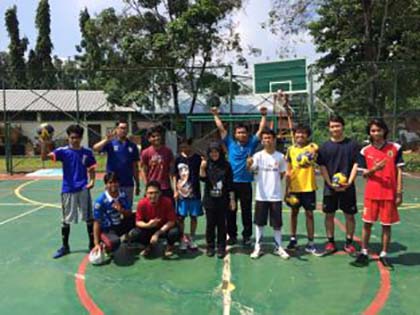
Outside of classes at university, I was also active in extracurricular activities. I belong to the handball club of the University of Indonesia, and I practiced handball on the campus court from 7am on weekends. Communication is important in team sports, so I actively participated in club activities because I thought that club activities were the best way to deepen exchanges with local students.
Except for advanced classes, most of the Indonesian language learned at the University of Indonesia is formal Indonesian, which is used in news and newspapers. It can feel weird. However, by talking with local students through club activities, I was able to learn informal Indonesian and try it out. As a result, my speaking skills have improved significantly.
Besides that, I actively interacted with the local residents. In Indonesia, there is a culture that puts more emphasis on the group than on the individual, so I was able to build relationships in such a small community and get to know their thoughts and values. Thanks to this kind of culture, it was a very heart-warming environment for people around me to always take care of each other and help each other. In the area where I lived, I could feel the love of the neighbors, which I had never felt in Japan. When I first came to Indonesia, in order to obtain a residence permit for foreigners, I had to ask several agencies such as neighborhood associations, city halls, and the police to prepare documents. However, at that time, I could barely understand the Indonesian language spoken by the locals, and I didn't even know where the place was, so I couldn't do anything by myself. At that time, when I talked to the wife of the owner of the share house where I lived about the necessary documents, she took me to the place where I had to go, and explained to the person in charge on my behalf. He also helped me with the necessary procedures. Also, the owner's wife seemed to have told other neighbors about me, and they were quick to lend a hand when something happened. As my Indonesian improved, it became a habit to chat with my neighbors over coffee after school and on weekend mornings. In Japan, I had no interaction with my neighbors at all, so even the simple things like drinking coffee and chatting with neighbors was a very enjoyable and precious time for me.
Except for advanced classes, most of the Indonesian language learned at the University of Indonesia is formal Indonesian, which is used in news and newspapers. It can feel weird. However, by talking with local students through club activities, I was able to learn informal Indonesian and try it out. As a result, my speaking skills have improved significantly.
Besides that, I actively interacted with the local residents. In Indonesia, there is a culture that puts more emphasis on the group than on the individual, so I was able to build relationships in such a small community and get to know their thoughts and values. Thanks to this kind of culture, it was a very heart-warming environment for people around me to always take care of each other and help each other. In the area where I lived, I could feel the love of the neighbors, which I had never felt in Japan. When I first came to Indonesia, in order to obtain a residence permit for foreigners, I had to ask several agencies such as neighborhood associations, city halls, and the police to prepare documents. However, at that time, I could barely understand the Indonesian language spoken by the locals, and I didn't even know where the place was, so I couldn't do anything by myself. At that time, when I talked to the wife of the owner of the share house where I lived about the necessary documents, she took me to the place where I had to go, and explained to the person in charge on my behalf. He also helped me with the necessary procedures. Also, the owner's wife seemed to have told other neighbors about me, and they were quick to lend a hand when something happened. As my Indonesian improved, it became a habit to chat with my neighbors over coffee after school and on weekend mornings. In Japan, I had no interaction with my neighbors at all, so even the simple things like drinking coffee and chatting with neighbors was a very enjoyable and precious time for me.
How would you sum up your study abroad experience at AUEP?
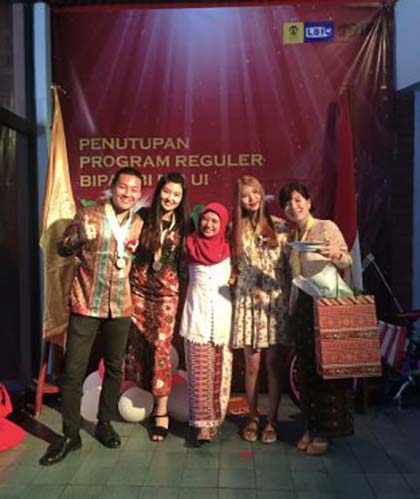
After studying abroad for about a year, I have greatly improved my Indonesian language skills, which was my goal. In particular, my conversational skills, which were almost zero, have improved so much that even the locals sometimes mistake me for being an Indonesian. I also learned that even if there are various differences such as religion, ethnicity, and race within the same community, it is precisely because people accept each other that multicultural coexistence is possible in Indonesia. Japan and Indonesia are both island nations, but I felt that Japan lacks the tolerance of Indonesia towards things that come from outside. I believe that the tolerance of each Japanese person is essential for Japan's multicultural society, where the foreign population is increasing.
International Student in Indonesia changed my way of thinking about Indonesia and Indonesian people, and I was able to grow as an international person. After graduation, students will be dispatched to high schools in Indonesia as part of the Japanese language education program "NIHONGO Partners" run by the Japan Foundation. As a Japanese language ALT, I tried not only to teach the Japanese language, but also what the Japanese people and Japanese culture are like, so that many Indonesians would be interested in Japan. I think Through these activities, I would like to give back to Indonesia, who gave me irreplaceable memories and experiences.
International Student in Indonesia changed my way of thinking about Indonesia and Indonesian people, and I was able to grow as an international person. After graduation, students will be dispatched to high schools in Indonesia as part of the Japanese language education program "NIHONGO Partners" run by the Japan Foundation. As a Japanese language ALT, I tried not only to teach the Japanese language, but also what the Japanese people and Japanese culture are like, so that many Indonesians would be interested in Japan. I think Through these activities, I would like to give back to Indonesia, who gave me irreplaceable memories and experiences.
Achievements after Studying Abroad ~My Before After~
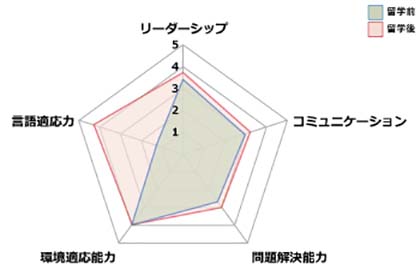
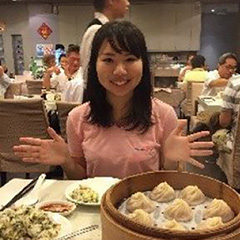
Sekiguchi Momo
Destination: Tamkang University, Taiwan
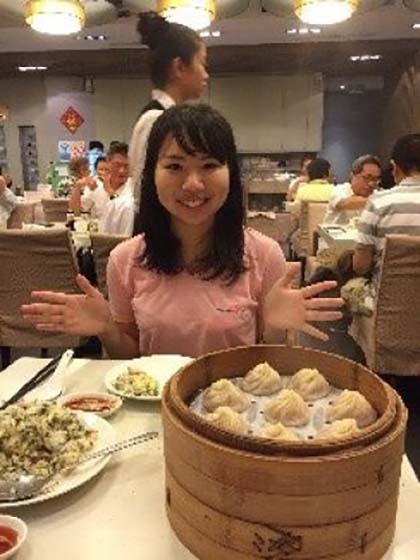
Momo Sekiguchi
Faculty of International Relations Department of Multicultural Communication
Faculty of International Relations Department of Multicultural Communication
- Participated in 2014 AUCP Study abroad at Dalian University of Foreign Studies, China for 5 months
- Participated in AUEP in 2015 Study abroad at Tamkang University in Taiwan for about a year
What is the purpose of participating in AUEP?
One of my goals for studying abroad was to improve my language skills. It is a matter of course to improve your language skills by studying abroad for a long period of about one year, but my biggest goal is to use those skills to learn specialized subjects at a local university and gain knowledge. there were.What kind of classes did you take there?
The major subject I wanted to study was the history of Taiwan. Since I don't have many opportunities to learn more about Taiwan during the period of Japanese rule, I definitely wanted to study in the Department of History. For that reason, I learned about the history of Taiwan as a basic knowledge in my own way while reading books before studying abroad.In the first semester, I majored in Japanese history, which I had a certain amount of knowledge about, in order to get used to the local classes. However, the Japanese history teacher was enthusiastic and explained things in an easy-to-understand way for me, International Student, using PowerPoint and videos, so it was easy to understand.
In the second semester, I wanted to study Taiwanese history in earnest, so I decided to take a class that was said to be difficult to pass the exam. There was a lot of historical terminology, and it was hard to keep up with, and I wasn't sure how much I would get on the exam, but I was able to pass the exam because my attendance was taken into consideration. The exam is written, but I was able to write more fluently in the final exam than in the midterm exam.
Looking back on your life there, how was it?
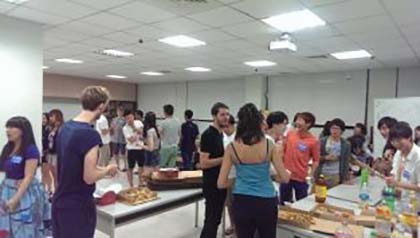
What I gained most from International Student is the many irreplaceable friends I have made. I lived in a dormitory on campus where many international International Student lived. Before I started studying abroad, the room allocation chart was announced, but in the four-person room, the roommates were Taiwanese, French, and Korean, and I was the only Japanese. I was nervous when I met them for the first time, but I could feel the goodness of everyone's personalities, and I can happily live with them for the next year! Intuitively, I felt relieved. However, soon after I started living there, I struggled with the language barrier.
In my case, my English and Chinese were half-baked at that time, so it was difficult for me to properly explain details such as dormitory and class procedures. there is
Four people who spent together from the beginning to the end of this International Student. When we parted, I was really lonely and had a strong feeling that I didn't want to leave, but I believe that we can meet again, so let's all work hard towards our dreams! I was able to part brightly. In addition to my roommates, I talk with Taiwanese and International Student from other countries every day in the lobby, eat meals, and go out together on weekends. It was an irreplaceable time.
In particular, the Taiwanese who lived in the dormitory only helped me every day. When I didn't understand something in Chinese class or when I was in trouble, I could rely on them. .
In my case, my English and Chinese were half-baked at that time, so it was difficult for me to properly explain details such as dormitory and class procedures. there is
Four people who spent together from the beginning to the end of this International Student. When we parted, I was really lonely and had a strong feeling that I didn't want to leave, but I believe that we can meet again, so let's all work hard towards our dreams! I was able to part brightly. In addition to my roommates, I talk with Taiwanese and International Student from other countries every day in the lobby, eat meals, and go out together on weekends. It was an irreplaceable time.
In particular, the Taiwanese who lived in the dormitory only helped me every day. When I didn't understand something in Chinese class or when I was in trouble, I could rely on them. .
Internship I tried during AUEP
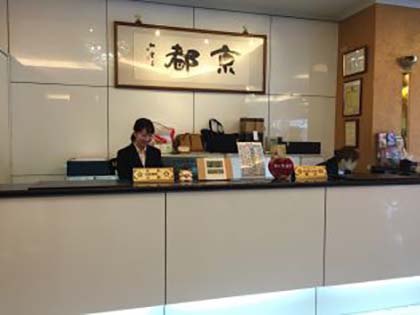
While I was studying abroad, I put a lot of effort into my classes at school, but I put as much effort into my internships. A Taiwanese who graduated from Asia University introduced me to a hotel run in Taipei City, where I worked with the staff for about half a year.
When I got busy with exams and other things, there were times when I would wake up at 5:00 a.m. and work until 3:00 p.m.
There were times when I felt that it was hard, but I was determined to complete it to the end because it was a challenge that I took on myself, and I was able to finish it safely. I felt a great sense of accomplishment because I worked hard. I was able to build a network with the customers I met at the hotel, and I gained a lot through the internship.
When I got busy with exams and other things, there were times when I would wake up at 5:00 a.m. and work until 3:00 p.m.
There were times when I felt that it was hard, but I was determined to complete it to the end because it was a challenge that I took on myself, and I was able to finish it safely. I felt a great sense of accomplishment because I worked hard. I was able to build a network with the customers I met at the hotel, and I gained a lot through the internship.
How would you sum up AUEP?
Looking back on my study abroad experience, various "challenges" made my International Student fruitful. One of the reasons for this is the application of language skills. Especially when it comes to studying abroad for a long period of time, I realized that the purpose and importance of studying in Chinese was not just learning Chinese, but from that point on, my options for taking on challenges expanded. All the experiences I gained from taking on challenges that I could only experience at my study abroad destination have become my strengths today.Achievements after Studying Abroad ~My Before After~
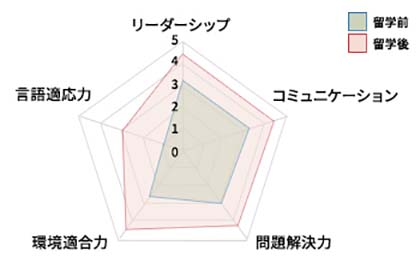
Change in language score
| Chinese test | HSK (Chinese Horizontal Test) | |
|---|---|---|
| Before participating in AUCP | Level 3 | ー |
| After participating in AUCP | Level 3 | 5th grade |
| After participating in AUEP | 2nd class | 6th grade |
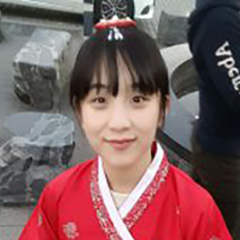
IKEGAMI Mayu
Destination: Dongseo University, South Korea
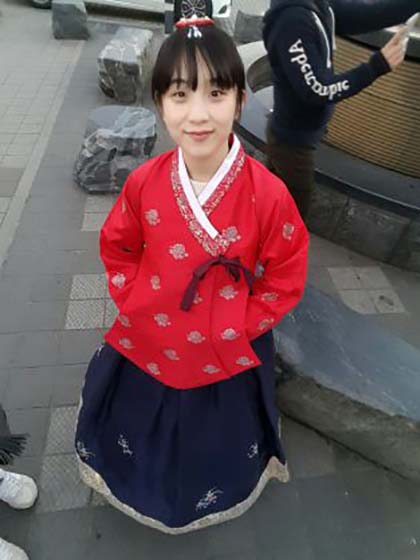
IKEGAMI Mayu
Faculty of Law Department of Law
Faculty of Law Department of Law
- Participated in 2013 AUGP Study abroad at Kyung Hee University in South Korea for about 3 weeks
- Participated in AUEP in 2015 Study abroad at Dongseo University in South Korea for about a year
What are your goals at AUEP?
I want to improve the Korean language I studied at university, and I can deepen my understanding by experiencing different cultures in the country that I am most interested in right now, knowing diverse values, and expanding my own world. was the goal. In addition, in terms of cross-cultural understanding, I interacted with Korean students and international International Student from other countries to change my sense of values in a positive way, I studied abroad because I wanted to be able to think about things from a different perspective.What kind of classes did you take there?
I belong to the Japanese Department of the Foreign Language Department of Dongseo University. During the day, I attend classes with Korean students, and at night, I go to the language school (Korean course) for foreign International Student belonging to the department to learn Korean. I studiedIn the first semester, I took classes on kanji for the first year, kanji and vocabulary for the second year, and reading classes for the third year. Since this is a class in the Japanese language department, for example, in the kanji class, Koreans learn Japanese kanji from Korean, and Japanese learn Korean words from Japanese. Also, in the third-year reading class, the contents of a book about the quotes of great people sold in Japan will be translated from Japanese into Korean, and they will also summarize the great people and present a Korean translation of the person and the content. I also challenged It took me a long time to prepare and I was nervous because I didn't have many opportunities to give presentations in my Japanese university classes, but it was a good experience.
In the first semester of the language school class, I not only deepened my understanding of Korean culture in Korean, but also deepened my understanding of each other's countries through Korean with international International Student from other countries. It was very interesting to be able to make friends from various countries here and learn about each other's countries in Korean.
In the second semester undergraduate classes, I took second-year kanji and vocabulary, reading, third-year reading, and novel classes. In the second-year reading, I learned basic grammar for translation, which I was able to use in my third-year reading class. Also, the most difficult thing was the novel class, which involved translating Japanese literature from Japanese into Korean. Or rather, there were many times when I didn't know anything at all, so I asked my Korean friends a lot of questions, and my friends helped me a lot.
At the language school in the second semester, there was always group work in each class, such as presentations and composition classes, which were not there in the first semester, and classes focused on speaking.
In my undergraduate classes, I was surrounded by only Korean students, so if I didn't understand Korean, I could easily ask them. bottom. However, I think that I was able to study in a very good environment after I was able to study while considering speaking in Korean and speaking in Japanese for each other's sake. . On the other hand, I didn't use Japanese at all in the classes at the language school, so I was able to see my Korean ability and felt like I had to study more.
Looking back on your life there, how was it?
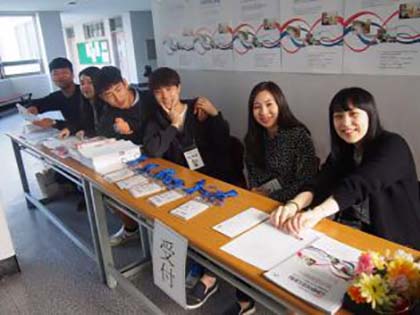
Outside of classes at university, I first helped my friend with a team that was participating in a Japanese debate contest, and also helped a friend who was participating in a Japanese speech contest. In particular, I have been involved in helping teams participating in debate competitions for a long time, and I have been going to school every day after school and during summer vacation to find materials to use in debates together and make preparations together.
The topic of the debate was about Japan, so my friends asked me a lot of questions, but there were many things I didn't understand, and I think I learned a lot together.
All the debate competitions are held in Japanese, so even Japanese people have to answer questions in Japanese that are difficult even for Japanese people. Being able to be involved in one thing for a long time like this while studying abroad was a good memory, and it also helped me maintain my motivation to work harder.
Outside of school, I participated in an event organized by an organization called the Korea-Japan Exchange Society, and I was able to interact with Koreans outside of school as well. Even if you are a college student in Korea, there are so many different ages, so I was able to talk with people of various ages, and I had the opportunity to get to know senior working adults through my friends. I think it was a good time.
I also have good memories of being able to feel the warmth of a family in Korea through being invited to my friends' homes and interacting with their families.
The topic of the debate was about Japan, so my friends asked me a lot of questions, but there were many things I didn't understand, and I think I learned a lot together.
All the debate competitions are held in Japanese, so even Japanese people have to answer questions in Japanese that are difficult even for Japanese people. Being able to be involved in one thing for a long time like this while studying abroad was a good memory, and it also helped me maintain my motivation to work harder.
Outside of school, I participated in an event organized by an organization called the Korea-Japan Exchange Society, and I was able to interact with Koreans outside of school as well. Even if you are a college student in Korea, there are so many different ages, so I was able to talk with people of various ages, and I had the opportunity to get to know senior working adults through my friends. I think it was a good time.
I also have good memories of being able to feel the warmth of a family in Korea through being invited to my friends' homes and interacting with their families.
In this study abroad, I really interacted with various people of various ages. Korean students on campus, Korean students from other schools, teachers, seniors who have graduated from university, International Student, Japanese International Student studying at other schools, Japanese people living in Busan, friends' families and grandmothers, I met a lot of people, including my relatives and the lady at the cafeteria. It gave me a chance to know. I made a lot of friends, and I was able to make many memories outside of school, such as sightseeing in and around Busan and participating in exchange events.
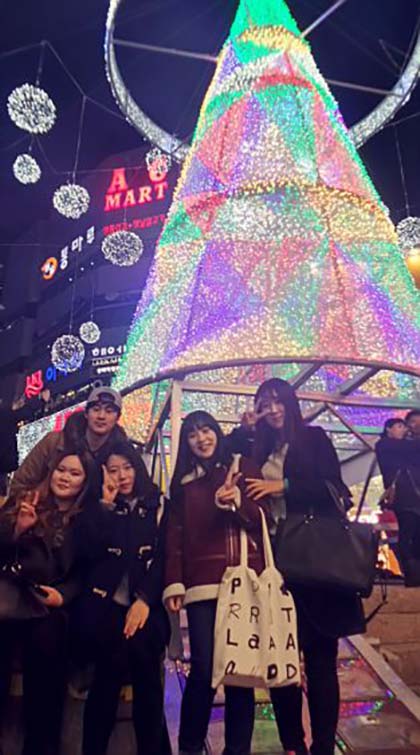
How would you sum up your study abroad experience at AUEP?
Looking back on my one-year study abroad experience, at the beginning of my study abroad, I was worried about using Korean, so I was not able to actively use it. Because I didn't have confidence in my Korean.However, it is not necessarily the case that I can speak with confidence now that I have finished studying abroad. But let's talk about it, I think it was thanks to the Korean friends around me that I thought it was okay to make mistakes. They tried their hardest to speak Japanese, which was difficult for them, and even when they were pointed out at times, they accepted it obediently and improved steadily. Seeing him like that made me realize that I had to do this too. It was obvious that I couldn't do it, but I realized that if I tried hard, the other person would listen to me properly, and I think I was able to become more proactive in terms of my actions.
In terms of language learning outcomes, I was able to get closer to the goal of improving my conversational skills that I thought I had before studying abroad, but I don't think I achieved it. However, studying abroad increased my motivation to study, and I began to think that I would like to continue studying hard and aim higher.
At AUEP, I think I learned a lot more than I expected. Every day was fulfilling and I had a lot of fun. Many times my Korean friends have told me, "You've changed a lot since you first came here." I'm sure there are both good and bad sides, but I think it's proof that it was fulfilling. And I was very happy to have friends who are so friendly and deeply connected even though they are from different countries. There are some students who want to study in Japan through me, and the good relationship we were able to build will be a lifelong treasure.
There were various things that happened during my study abroad, but it was a study abroad that allowed me to grow as a person. I think that I was able to finish my study abroad safely thanks to the support of many people. I really want to thank you. thank you very much.
Achievements after Studying Abroad ~My Before After~
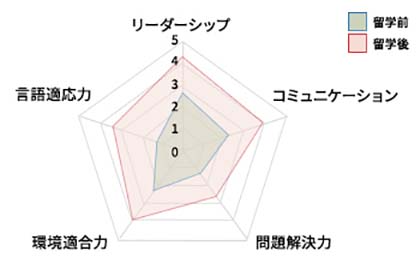
<Updated June 21, 2024>